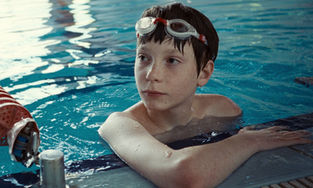'Shining Girls' Season 1 Review: Elisabeth Moss & Wagner Moura Shift Reality In Apple TV+ Thriller
- S.J.

- Apr 27, 2022
- 2 min read
Updated: Oct 29, 2023

When timelines start melding together, it is clear that only proper journalistic work can stop a violent criminal travelling in those spaces. Well, kind of. That is somewhat descriptive of Shining Girls which is a new time-bending thriller series adapted by showrunner Silka Luisa from Lauren Beukes' novel of the same name.
Its first season tracks Kirby Mazrachi (Elisabeth Moss, also directing) who's sometimes a journalist, sometimes an archivist at a Chicagoan newspaper. Few years have passed since she was a victim of an assault but a new murder case comes across the desk of crime reporter Dan Velazquez (Wagner Moura), resembling her experience. They end up working together, mainly from Kirby's initiative, to figure out who's behind the attacks and murders. Army veteran Harper Curtis (Jamie Bell) becomes the main suspect but they still have to unravel how he might have committed all of it, especially since similar cases are found from several past decades and Kirby finds things in her life changing unexpectedly.
Just as Kirby is quite disoriented from everything happening, it wouldn't be a shocker if viewers could relate to that right away since the first episode is definitely the weakest of the bunch. There are several clunky introduction scenes and poorly executed cuts to transport you to other places but the worst part is that we start with Kirby whose journey is incredibly difficult to interact with; partly because Moss seems to play up the psychological part to a much higher degree than show's visual storytelling, and partly because Kirby as a character is reactionary and not propulsive in every episode after as well. It also doesn't necessarily help that Moura is much more in tune with the overall tone, which compliments the menace and suspense that surrounds scenes featuring Harper and Bell's equally contained performance in that role.
Problem here isn't strictly that Luisa and company's writing lacks ideas—they do some interesting things, few which then pay off in the latter half of the season—it's merely that there seems to be no clue about how to bring that to foreground in that aforementioned visual storytelling capacity. Shining Girls's cinematography (Robert McLachlan and Bonnie Elliott), for example, changes noticeably from episode to episode even when there's no apparent reason for it; there are also aspects that are inadequate overall like the lighting which is especially careless when darker skin tones are on the screen with lighter Moss, such as Chris Chalk's who plays Kirby's husband Marcus.
Later in the season, clumsy editing (contributions by Hugo Diaz and Jessica Hernández) with even a couple glaring mistakes get increasingly distracting, while Claudia Sarne's excellent score filled with reverb-drowned keys and soundscapes tries its hardest to soften those blows. Still, the apparent void of vision, that should first of all meld the screenwriting and visuals together, does prevent the show from projecting its biggest possible shine.
Smileys: Wagner Moura, score
Frowneys: Lighting, writing, Elisabeth Moss
No vampires here, despite the name.










